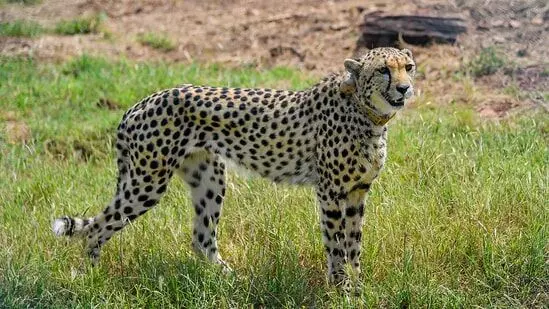Project Cheetah takes off; Namibian 'Jwala’ gives birth to three cubs at MP’s Kuno National Park
Jwala, Aasha, and Siyaya are among the cheetahs translocated to India from Namibia under Prime Minister Narendra Modi's 'Project Cheetah'
By Sri Lakshmi Muttevi
Madhya Pradesh: Namibian cheetah `Jwala’ has given birth to three cubs at the Kuno National Park in Madhya Pradesh, weeks after three cubs were born to another feline.
Union Environment Minister Bhupender Yadav shared the news on X, saying, "Kuno's new cubs! Namibian Cheetah named Jwala has given birth to three cubs. This comes just weeks after Namibian Cheetah Aasha gave birth to her cubs."
He further said in the post, "Congratulations to all wildlife frontline warriors and wildlife lovers across the country. May Bharat's wildlife thrive."
On January 3, Kuno National Park officials reported that Namibian cheetah Aasha had given birth to three cubs. Before this, a cheetah named Siyaya had given birth to four cubs last March. However, only one of them survived.
Jwala, Aasha, and Siyaya are among the cheetahs translocated to India from Namibia under Prime Minister Narendra Modi's 'Project Cheetah', aimed at re-introducing the only large carnivore species that went extinct in independent India.
Cheetah Shaurya dies in Jan 2024
On January 16, Namibian cheetah Shaurya died at the Kuno National Park (KNP) in Madhya Pradesh. The cause of the feline's death was not immediately clear and it will be known only after a post-mortem examination, said a forest department statement.
Shaurya was found not walking properly by the tracking team around 11 am after which the wild animal was tranquilized and efforts were made to revive the feline, but they failed, Complications arose post-revival and the wild animal failed to respond to CPR (cardiopulmonary resuscitation) and died.
Cheetah Reintroduction Project:
Cheetah, the fastest land animal, was declared extinct in the country in 1952. The relocation of cheetahs from Africa and Namibia is part of the government's ambitious plan to revive their population in the country.
Under the Cheetah Reintroduction Project, eight Namibian cheetahs - five females and three males - were relocated to the Kuno National Park in September 2022. In February 2023, another 12 cheetahs were brought to the national park from South Africa. Since March 2023, seven adult cheetahs have died in Kuno National Park due to various reasons, taking the total death count of felines in the park, including three cubs, to 10.
In May 2023, while voicing concern over the death of the big cats, the Supreme Court asked the Union government to file a detailed affidavit explaining the reasons behind the deaths and remedial measures taken to prevent the deaths
15 cheetahs in enclosure:
Since August 2023, 15 cheetahs (seven male, seven female, and a cub) were kept in bomas (enclosures) in the KNP.
Six adult cheetahs have died since March due to various reasons, taking the total death count of felines, including three cubs, to nine.
Last year, after a spate of deaths, all of the cheetahs were darted and brought back to a fenced enclosure for closer examination.
Since then, most of the animals continue to remain in one-square-kilometre enclosures called bomas, where they hunt and feed themselves. Only two animals are in the larger wild grasslands of the 748 sq-km, Kuno National Park, Sheopur, Madhya Pradesh.
According to the officials, In the coming months, all of these animals are expected to be released into the wild. The officials are also in the process of preparing the Gandhi Sagar Park (Madhya Pradesh) for the next batch of cheetahs, likely later this year.
Collar-related infections
After two cheetahs Tejas and Suraj died, experts have said that the cheetahs’ deaths were due to infected wounds caused by the radio collars around their necks. All cheetahs fitted with radio collars were inspected.
It is said that the cheetahs died due to septicemia (an infection of the bloodstream) caused on its neck by the radio collar, a device used to track animal movement. The humid or wet weather could have caused water to accumulate underneath the collar, keeping the skin constantly wet. Flies attracted to the spot lay eggs and the maggots that emerge “feed on tissues and create wounds that get infected and can lead to systemic infection”.
In July 2023, the radio collars of six cheetahs were removed for their “health examination” by veterinarians from the KNP and experts from Namibia and South Africa.
The cheetahs whose radio collars have been removed are identified as Gourav, Shourya, Pavan, Pavak, Asha and Dheera